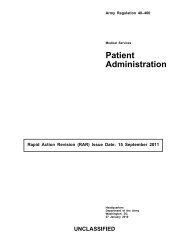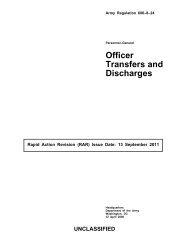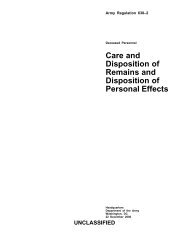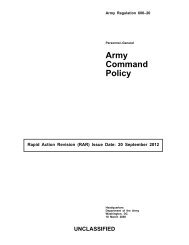Interception of Wire and Oral Communications for Law ... - U.S. Army
Interception of Wire and Oral Communications for Law ... - U.S. Army
Interception of Wire and Oral Communications for Law ... - U.S. Army
Create successful ePaper yourself
Turn your PDF publications into a flip-book with our unique Google optimized e-Paper software.
otherwise subject to interception under this regulation, <strong>and</strong> shall be terminated upon attainment <strong>of</strong> the authorized<br />
objective.<br />
(7) No order entered by a military judge may authorize an interception <strong>for</strong> any period longer than is necessary to<br />
achieve the objective <strong>of</strong> the authorization, nor in any event longer than 60 days. Extensions <strong>of</strong> an order may be granted,<br />
but only upon application <strong>for</strong> an extension made in accordance with the procedures <strong>of</strong> 18 U.S.C. 2518(1), <strong>and</strong> after the<br />
military judge makes the findings required by paragraph 2–2a(4) above. The period <strong>of</strong> extension shall be no longer<br />
than is necessary to achieve the purpose <strong>for</strong> which it was granted <strong>and</strong> in no event <strong>for</strong> longer than 60 days. Applications<br />
<strong>for</strong> extensions must be <strong>for</strong>warded through channels in the same manner as prescribed <strong>for</strong> original applications.<br />
(8) The contents <strong>of</strong> communications intercepted pursuant to an order issued by a military judge shall, if possible, be<br />
recorded on tape or wire or other comparable device. The recording <strong>of</strong> the contents <strong>of</strong> such communications shall be<br />
done in such a way as will protect the recording from editing or other alterations. Custody <strong>of</strong> recording shall be<br />
maintained in accordance with AR 195–5, Evidence Procedures. Recordings shall not be destroyed, except pursuant to<br />
paragraph 6–4, this regulation.<br />
(9) The contents <strong>of</strong> a communication intercepted abroad, or evidence derived therefrom, is inadmissible in any<br />
court-martial proceeding, in any proceeding under Article 15 <strong>of</strong> the UCMJ, or in any other proceeding if the:<br />
(a) Communication was intercepted in violation <strong>of</strong> this regulation or applicable law.<br />
(b) Order <strong>of</strong> authorization under which it was intercepted is insufficient on its face.<br />
(c) <strong>Interception</strong> was not made in con<strong>for</strong>mity with the order <strong>of</strong> authorization.<br />
b. When the target <strong>of</strong> an interception conducted abroad is a person who is not subject to the UCMJ:<br />
(1) The Request <strong>for</strong> Authorization shall be prepared <strong>and</strong> <strong>for</strong>warded <strong>for</strong> approval in accordance with the procedures<br />
in paragraphs 2–1a <strong>and</strong> b. The request may if appropriate, recommend that a judicial warrant be sought from a court <strong>of</strong><br />
competent jurisdiction <strong>and</strong> will indicate sufficient facts to establish—<br />
(a) Probable cause or belief that particular communications concerning the <strong>of</strong>fense will be obtained through<br />
interception <strong>of</strong> wire or oral communications.<br />
(b) Probable cause or belief that the facilities from which or the place where the wire or oral communications are to<br />
be intercepted are being used, or are about to be used in connection with the <strong>of</strong>fense, or are leased to, listed in the<br />
name <strong>of</strong>, or commonly used by the target <strong>of</strong> the proposed interception.<br />
(c) Whether normal investigative procedures have been tried <strong>and</strong> have failed, or they reasonably appear to be<br />
unlikely to succeed if tried or to be too dangerous.<br />
(2) The DOD General Counsel shall determine whether to approve the request, using the st<strong>and</strong>ards set <strong>for</strong>th in<br />
paragraph 1–4d. If the request is approved, the procedures set <strong>for</strong>th in paragraphs 2–1c through e will be followed to<br />
obtain an approved court order.<br />
2–3. Emergency nonconsensual interceptions in the United States <strong>and</strong> abroad<br />
If, in the judgment <strong>of</strong> the Secretary <strong>of</strong> the <strong>Army</strong>, the Under Secretary <strong>of</strong> the <strong>Army</strong>, or the <strong>Army</strong> General Counsel the<br />
emergency need <strong>for</strong> a nonconsensual interception precludes obtaining the advance written approval <strong>and</strong> court order<br />
required by paragraphs 2–1 <strong>and</strong> 2–2, they shall notify the DOD General Counsel who shall determine whether to seek<br />
the authorization <strong>of</strong> the Attorney General <strong>for</strong> an emergency nonconsensual interception in accordance with the<br />
procedures <strong>of</strong> 18 U.S.C. 2518(7).<br />
2–4. Time limits <strong>for</strong> nonconsensual interceptions<br />
Nonconsensual interceptions within the United States may be approved <strong>for</strong> a period not to exceed 30 days. Nonconsensual<br />
interceptions outside the United States may be approved <strong>for</strong> a period not to exceed 60 days. Renewal requests <strong>for</strong><br />
specified periods <strong>of</strong> not more than 30 days each (60 days <strong>for</strong> interceptions outside the United States), shall be<br />
submitted to the approving authority <strong>for</strong> consideration in the same manner as prescribed <strong>for</strong> original applications. The<br />
interception in all instances shall be terminated as soon as the desired in<strong>for</strong>mation is obtained, or when the interception<br />
proves to be nonproductive.<br />
2–5. Consensual interceptions<br />
a. The following procedures are applicable to all consensual interceptions <strong>of</strong> oral or wire communications:<br />
(1) When one <strong>of</strong> the parties to the conversation consents to an intended interception <strong>of</strong> a communication, the<br />
MACOM investigative or law en<strong>for</strong>cement <strong>of</strong>ficial shall prepare a request as prescribed <strong>for</strong> nonconsensual interceptions,<br />
except containing only the following in<strong>for</strong>mation:<br />
(a) A description <strong>of</strong> the facts <strong>and</strong> circumstances requiring the intended interception, the means by which it would be<br />
conducted, the place in which it would be conducted, <strong>and</strong> its expected duration.<br />
(b) The names <strong>of</strong> all the persons whose conversations are expected to be intercepted <strong>and</strong> their roles in the crime<br />
being investigated. When the name <strong>of</strong> the nonconsenting party or parties is not known at the time the request is made,<br />
the <strong>of</strong>ficial making the request shall supply such in<strong>for</strong>mation within 30 days after termination <strong>of</strong> the interception. If<br />
such in<strong>for</strong>mation is not known at the end <strong>of</strong> this period, it shall be supplied whenever it is later discovered.<br />
6 AR 190–53 3 November 1986
















